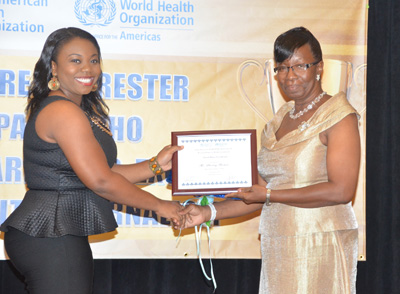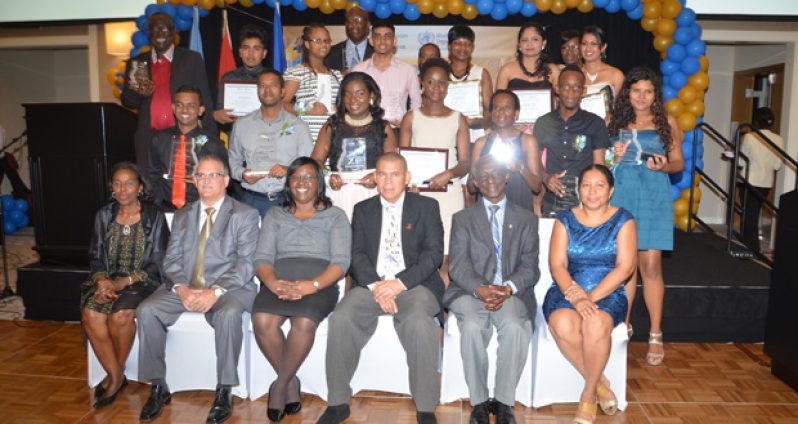GUYANA Chronicle’s Tajeram Mohabir and Svetlana Marshall on Friday evening beat out more than 45 competitors to emerge victorious in the Print Category of the Clare Forrester PAHO/WHO Media Awards for Excellence in Health Journalism.

Mohabir, no stranger to excellence in reporting, won the Best News Story Award. He also won the prize last year when the award was re-introduced to Guyana.
Marshall, a graduate of the University of Guyana, copped the top prize for the Best News Feature.
Both Mohabir and Marshall were presented their awards at a gala dinner at the Guyana Marriott Hotel.
The prestigious occasion was attended by PAHO/WHO Country Representative Dr William Adu-Krow, Public Health Minister Dr George Norton, Minister within the Ministry of Health Dr Karen Cummings, Tourism Minister Catherine Hughes and members of the diplomatic corps, among others.
The Clare Forrester PAHO/WHO Media Awards for Excellence in Health Journalism was divided into six categories: Best News Story – Print, Best News Feature – Print, Best News Story – Television, Best News Feature – Radio, Best News Story – Online and Best News Feature – Online.
“Don’t invest in killing yourself – former chain smokers urged, support tobacco control legislation,” was the story that led Mohabir to the top. He was followed by Ravin Singh, whose story was headlined “Breast cancer ranked No.1 cancer in Guyana – public awareness helping more to get tested early.”
Stabroek News Zoisa Frazer received the third-place prize. Though he was not nominated for the award in the Best News Story Category, the Guyana Chronicle’s Navendra Seoraj received an honorary certificate for his efforts.
Meanwhile, in the Best News Feature Award – Print, Marshall’s feature “Enough not being done for ‘sicklers’ – says victim, Dr Norton pledges gov’t support” was adjudged the best.
Kaieteur News Desilon Daniels received the second-place award, while Shirley Thomas,again of the Guyana Chronicle, came in third in the Best Feature Story Award – Print.
HGP Nightly News Handell Duncan was adjudged the winner of the Best News Story- Television, while Stabroek News David Papanna received the Best Feature Story Award-Online.
Jeanna Pearson of Kaieteur News also topped the Best News Story Award in the Online Category. Several other awards were also presented. The top awardees received a plaque and US$1,000 each, while the second-place winners received a plaque and US$500 each.
Majority in print media
The Chief Judge of the 2015 PAHO/WHO Media Awards, Dr Paloma Mohamed in delivering her report, disclosed that a total of 78 submissions were made with 48 from print alone, three radio, two television and 21 online entries.
“The survival of any nation is the health and well-being of its people,” Minister Cummings said, as she underscored the importance of the media in raising awareness in the area of health.
“Great focus and emphasis must be placed on promoting healthy lifestyles and healthy choices, so that persons can be better educated and made aware of the ways in which they can remain healthy and live long, healthy lives,” she said.
She alluded to the fact that a vast majority of the public get their information on health and science from the mass media. As such, she said it is important for journalists to disseminate accurate and reliable health information.
“As health journalists, you are also responsible for creating awareness about health issues that are current and relevant to the population.
“However, as health journalists you also play a much bigger role in influencing behavioural and lifestyle changes among persons in society, impacting health policy, and stimulating new discussions about the important health issues and developments you include in your various productions.”
She said further that journalists not only play a critical role in health, but also in all areas of development, noting that they are the seeds that foster the blossoming and flourishing of democracy and the empowerment of the people.”
In spelling the acronym “SEED,” the Heath Minister said Guyanese journalists should see the story from all angles, noting that reporting must be fair and balanced.
“E – Engage the public in responsive and responsible dialogue in the quest to promote a more open and progressive society,” she added, noting that journalists must also be ethically sensitive to the truth and the facts over and above sentimental, sensational and sellable attributes.
Journalism must also serve as an independent monitor of power, Minister Cummings emphasised.
“It has often been said that journalism has an unusual capacity to serve as watchdog over those whose power and position most affect citizens,” she said.




.jpg)










